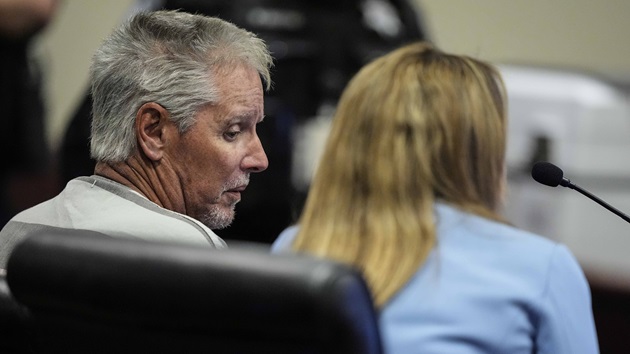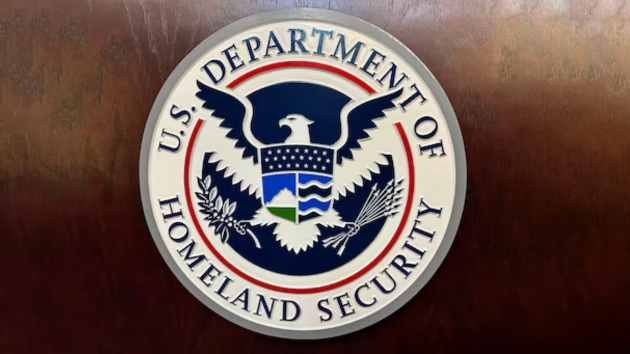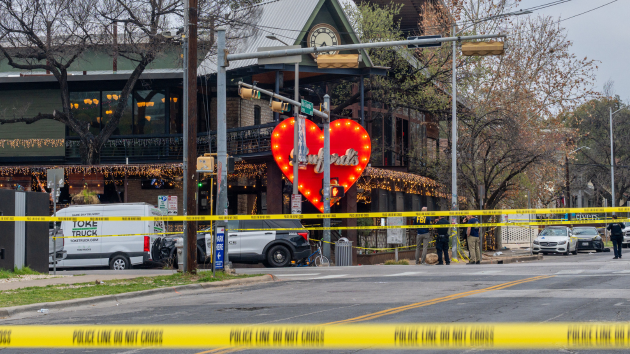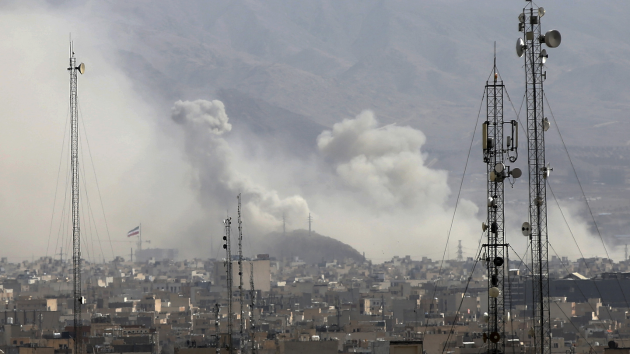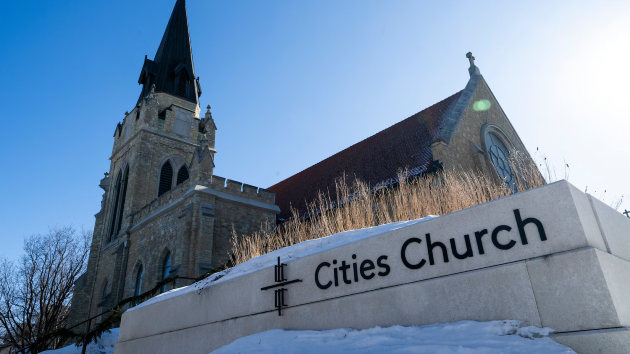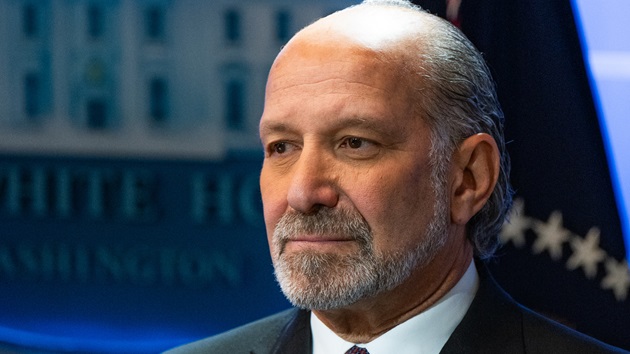
(WASHINGTON) — When unemployed marine biologist Lanny Flaherty poked his head into the ranger’s station at the Wallowa Whitman National Forest in the Pacific Northwest and asked to be a volunteer, he said it put him on a 13-year career path with the U.S. Forest Service that included stints as a botanist, a wildfire resource adviser and a range ecologist.
When he wasn’t researching the effects of vegetation on fire behavior or identifying fungi on national forest land, the 40-year-old Flaherty said he was a “red-card” carrying certified firefighter, helping battle some of the biggest wildland fires in the nation.
In 2016, he helped fight the Great Smoky Mountain wildfires, the largest arson blazes in Tennessee history, and in 2021, he helped extinguish the Dixie Fire that swept through five Northern California counties, scorching nearly a million acres and destroying more than 1,300 structures.
“I’m so proud of everything I’ve done,” Flaherty told ABC News. “Stumbling into the Forest Service was the first time in my life where I was like, ‘Oh, this fits. I’m running with it. This is me.'”
But while on assignment last week with a U.S. Forest Service fire engine crew in Louisiana restoring federal land and structures at the Kisatchie National Forest that had been devastated by hurricanes, Flaherty said his job came to an abrupt end.
As a probationary range ecologist, he was among several thousand probationary workers terminated from the U.S. Forest Service in the Trump administration’s sweeping reduction in the federal workforce being overseen by billionaire Elon Musk and the new Department of Government Efficiency (DOGE).
“It’s absolutely heartbreaking to end up under the bus on what’s obviously a politically motivated illegal termination,” said Flaherty, whose two-year probationary period wasn’t scheduled to end until November of this year. “I mean, I’ve got 13 years’ worth of qualifications and I was cast aside as a probationary employee, despite having proven myself time and time again in a multitude of different positions.”
The U.S. Department of Agriculture, which oversees the U.S. Forest Service, announced that 2,000 USFS “probationary, non-firefighting employees” were being let go. At least 1,000 probationary employees of the National Park Service, which is under the U.S. Interior Department, were also terminated, including those who worked as secondary firefighters.
“To be clear, none of these individuals were operational firefighters,” USDA Secretary Brooke Rollins said in a statement.
Rollins, according to the USDA statement, “fully supports the President’s directive to improve government, eliminate inefficiencies, and strengthen USDA’s many services to the American people.”
“We have a solemn responsibility to be good stewards of the American people’s hard-earned taxpayer dollars and to ensure that every dollar spent goes to serve people, not the bureaucracy,” the USDA statement reads.
‘These fires are going to get exponentially bigger’
While hosting a roundtable in Washington, D.C., on Wednesday with U.S. Forest Service wildland firefighters, Rollins praised their response to the devastating January wildfires in Los Angeles County that decimated the communities of Pacific Palisades and Altadena. Following the meeting, the USDA released a statement, saying, Rollins is “committed to ensuring that the United States has the strongest and most prepared wildland firefighting force in the world to save lives and protect our beautiful homeland.”
But the National Federation of Federal Employees (NFFE) told ABC News that the USFS cuts will severely weaken the agency’s ability to respond to wildfires.
Steve Gutierrez, NFFE’s national business representative, said that based on data the union requested from the USFS, the number of fired probationary non-fire personnel is about 3,400.
Flaherty said that in the past five years, 40% to 50% of his job was fighting wildfires as part of what the Forest Services refers to as “militias” comprised of trained secondary firefighters.
“When a fire breaks out, we’re out there like everybody else getting into the fray,” Flaherty said.
Gutierrez, a former USFS firefighter, told ABC News that the cuts affect about 10% of the U.S. Forest Service’s total workforce. He said many of the terminated employees held dual jobs, like Flaherty, including working as firefighters responding to all-hands-on-deck blazes throughout the country.
“When I say ‘non-fire personnel,’ we can’t totally think that they don’t ever touch fire, that they’re not important,” Gutierrez said. “They’re all part of this logistical machine that helps support fire. They’re either ecologists, they’re mechanics, they’re pilots, they’re water systems operators, they’re grants and agreements folks, they’re land management, minerals and geologists to help recovery efforts from the aftereffect of fire.”
He added, “They support all of what happens before fire, during a fire and after a fire.”
Gutierrez said some of the federal employees who got fired had just helped battle the Los Angeles fires just weeks ago.
“They just fought this fire in LA, one of LA’s most devastating wildfires that we’ve ever had and now they’re terminated because they have ‘poor performance,'” Gutierrez said. “It’s just crazy to me that you can be so utterly disrespectful and ultimately it’s a slap in the face to these brave men and women who have risked their lives for the American public.”
Making matters worse, Gutierrez said, is an imposed hiring freeze, which has stalled the annual task of “fuels management,” which means clearing federal lands of fire hazards like dead trees and overgrown brush.
“If we’re not able to get that process moving immediately, fires are not going to just be, like, small. These fires are going to get exponentially bigger. Communities are going to burn and people are going to die, and that’s what’s going to happen,” Gutierrez said. “It’s not going to be just a California problem. It’s going to be a United States problem. I mean, there are several states, New Jersey, for example, they had a fire every year, every month for the past year. There was a fire in New York, right there in Manhattan. It’s not going to stop. It’s a national issue.”
Almost stranded in Louisiana
Flaherty said that when he got a call in Louisiana from his forest supervisor relating that he was terminated effective immediately with no severance package, he was initially told he’d have to get his own transportation back to Oregon.
“He offered no solution whatsoever, despite being fully aware of the fact that I would be stranded in Louisiana and unable to make travel arrangements short of purchasing myself a ticket. I was not in Louisiana on my own time, I was there on official travel and his plan was to, I guess, just wing it,” Flaherty said.
Flaherty said his union, the NFFE, intervened and got the USFS to cover his transportation by temporarily rescinding his termination until it got him back to Oregon.
“It’s just really sad that the top of the food chain doesn’t understand the impacts of what they’re doing when they swipe their pen,” said Gutierrez, responding to Flaherty almost being stranded in Louisiana. “They don’t understand the complexities of the entirety of the government.”
Flaherty said the “insult still rings true even though I am back home.”
“To me, that just kind of sums up how callous and poorly thought out all of this is,” Flaherty said. “I have deep, deep concerns for the amount of stress that everybody has been put through in every agency, and it just continues. It’s harming people’s physical and mental well-being, and it’s criminal.”
‘Dream job’
Eric Anderson said that in June 2024 he landed a job as a biological science technician and lead fire effects monitor for the National Park Service, after working since 2021 as a seasonal employee.
“I spent two years, three years working as a temporary hire to keep my face seen, to improve my qualifications, to gain more experience. And now, I finally get into a position that I knew three years ago, OK, my predecessor, is probably going to be retiring. I think I can improve my qualifications and become useful to do that position. And I worked toward it, I applied, and I got the position.”
Like Flaherty, Anderson, 48, a married father of two high school-aged children, told ABC News that he was fired in what he called, “the Valentine’s Day massacre.”
“You finally get your dream job that you’ve been working toward for many years, and it just got pulled out from under you for politics,” said Anderson, who was stationed at the Indiana Dunes National Park on the southern shore of Lake Michigan.
He said he received his dismissal letter in his email inbox from an Interior Department administrator he had never met.
“The Department determined that you have failed to demonstrate fitness or qualifications for continued employment because your subject matter knowledge, skills, and abilities do not meet the Department’s current needs, and it is necessary and appropriate to terminate, during the probationary period, your appointment to the position of BioScience Tech (Fire Eff. Monitor),” reads the dismissal letter Anderson shared with ABC News.
“This is a lie. This says I’m fired because of my performance and my inability to do the job and that I’m no longer needed. My performance evaluations are excellent, and I’m crucial to the program. I have qualifications that we need within our unit to function,” Anderson said. “It’s a bit maddening.”
A former Peace Corps volunteer from 2000 to 2002 in Kenya, East Africa, Anderson said he used to work as a consultant in the private sector and took a huge pay cut when he joined the NPS as a seasonal employee.
“My bosses worked really hard to justify that I should be kept on, noting that in my position description, yes, it says biological science technician, but if you just read down a few lines, you see the box checked that says wildland firefighter, which was supposed to be in the protected ones that weren’t getting fired,” Anderson said.
In his job as a biological science technician, he said he would collect plant samples for analysis and prepped parklands in the winter months for the fire season, eliminating hazardous fuels by conducting prescribed or controlled burns. His work also included rehabilitating burned land.
“When bulldozers come through trying to protect towns, someone has to put that back together. So, we worked very much on how do we keep this from washing down the mountain during the next atmospheric river,” Anderson said. “By mid-August or so, we’re pretty much done with our sampling at various parks around the Great Lakes that we go to, and then we are available to do wildland fire or help as collaterals for wildland fires,” Anderson said. “A lot of the people that were let go in the last week were also collateral firefighters.”
In September, Anderson worked on the front lines of the Line Fire that burned more than 44,000 acres in and around the San Bernardino National Forest and threatened the community of Highland, California. In August 2023, Anderson said he helped battle the Happy Camp Complex Fire, which burned more than 21,000 acres in the Klamath National Forest in Northern California’s Siskiyou County.
He just returned in January from conducting prescribed fires in the Florida Everglades.
“Maybe, this is that Peace Corps volunteer in me that looks for mission-driven work. I know that’s just my personality type. I need to be working somewhere that I feel it’s important,” Anderson said. “I very much want to go back and work for the place that I was just fired from. I live what I do. These are all very qualified, excellent people doing good work that needs to be done and they’re just slashed without any real cause.”
Copyright © 2025, ABC Audio. All rights reserved.
- Manhattan’s congestion pricing can continue, judge rules - March 3, 2026
- American travelers in the Middle East speak out amid Iran conflict - March 3, 2026
- Suspected school shooter’s father convicted of murder - March 3, 2026



